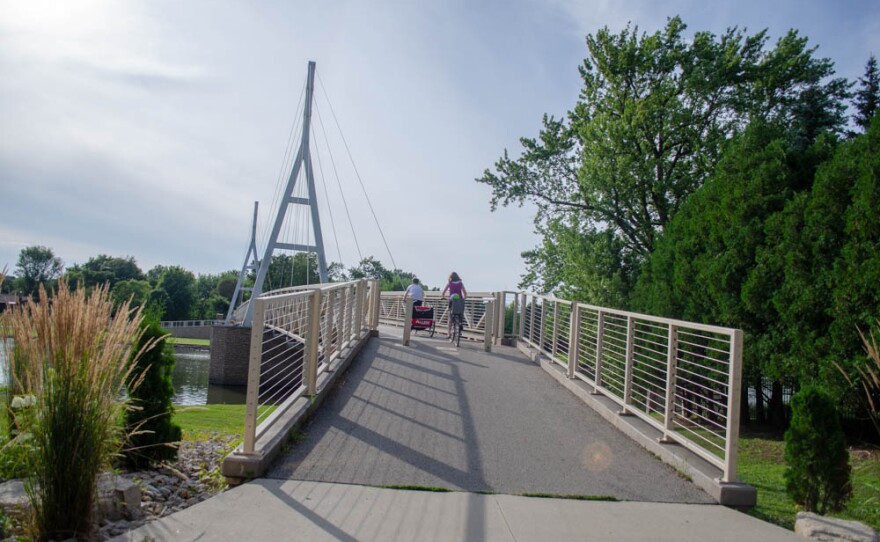Many small Iowa communities are facing an aging population. This is sometimes seen as an issue for communities that worry about what this could mean for their future. But Charles City is taking a different approach to this issue by working to become more senior-friendly and is making extra efforts to embrace -- and even grow -- its senior population.
On the main street of Charles City, just several hundred feet from the Cedar River that snakes through the town’s center, is Schiller’s Fine Art Gallery.
It's the retirement plan of 67-year-old owner Steve Schiller.

"This is a gallery that I've set up for local artists. I've got 32 local artists in here right now with different things as far as painting, pottery and jewelry," said Schiller.
Schiller's lived in Charles City for 30 years with no plans to leave. He thinks it’s great for seniors.
"I think it's just a small town atmosphere, you know, it's just an easy going place, they can go out and walk about anywhere, you know, and stuff," he said.
Older residents like Schiller are often a forgotten asset for small communities, said Charles City Community Development Director Mark Wicks.
"They are a tremendous treasure trench of wealth, of experience, of knowledge, of wisdom that I don't think we tap into nearly enough," Wicks said.
That’s why local officials have plans to start investing in seniors as a valuable resource.
This summer, AARP designated the city of about 7,400 as the state’s second “age-friendly community” -- after Des Moines. This means it’s creating a five-year plan to make the city more friendly for seniors by working on things like transportation, housing and health concerns like loneliness.
Brad Anderson, the state director for AARP, said this kind of thinking makes Charles City a model for the state.
"The one thing that Charles City recognizes that all Iowa communities should recognize is the fact that our communities are getting older," he said.
According to the state Department of Aging, by 2050, people 65 and older will make up nearly a fifth of Iowa’s population.
Right now, nearly a quarter of Charles City’s residents are over 65.
Jim Erb, the former mayor of Charles City was one of the officials who approached AARP.

"Iowa, in general, has been guilty, a little bit, of thinking senior citizens are something we have to take care of, but they're not active assets that we should be encouraging," he said.
Dean Andrews, the town’s current mayor, said helping seniors -- and even bring in more -- will benefit the entire community.
"We know that a lot of seniors, as they get to that age, have more expendable income. They don't have young families. They don't have college costs anymore. They don't have housing costs," he said.
But some worry the town is not focusing enough on young people.
At a boutique called the Rustic Corner on Main Street, 34-year old employee Jessica Keifer can think of just one reason why she likes Charles City.
"My family's here," Keifer said with a laugh.
Keifer said she’d like to see more activities for young people like herself -- and her six boys.
"Maybe a better pool, parks. More activities, like skating or something for kids to do," Keifer said.
Keifer said she also feels the town needs more jobs. She says her husband is one of 500 employees recently laid off from a chicken processing plant that’s closing.

"We need more that employs a lot of people like that," Keifer said.
Just down the road from the Rustic Corner is Charles City’s whitewater rafting park. It’s the first in the state and stretches down the Cedar River. The park hosts runners, fishermen and rafters of all ages.
Development Director Mark Wicks pointed out from his air conditioned car on a hot summer afternoon that just a decade before, the riverfront was rundown following decades of floods and tornadoes.
"Just for the longest time, it sat unutilized and kind of ignored," Wicks said.
Wicks said the riverfront offers a lot to Charles City residents, much like its senior population.
"I just keep comparing that with what we're talking about with Age Friendly communities and our senior citizen population," said Wicks. "They are an absolute treasure that we can't afford to ignore and forget about because they have so much to offer."
Charles City and AARP will begin working this fall to create a five-year plan to become more “age-friendly.”
-----
Natalie Krebs is IPR's health reporter. Funding for her work is provided by the Mid-Iowa Health Foundation.
Iowa In Focus is made possible by contributing members of Iowa Public Radio.
Your need to stay informed never takes a break, and neither does IPR. From daily newscasts and talk shows, to this Iowa In Focus series, you can rely on Iowa Public Radio to deliver insightful, fair-minded coverage that digs into the heart of the issue. Support this project, and the daily coverage that keeps you connected, by becoming a member today. Donate now.





